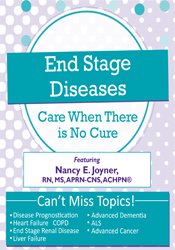

Are you ever looking for creative ways to make sure someone’s legacy will be passed on? Well think about what we did with Harold, a patient with metastatic bowel cancer. He was part of a local “village” that, over the years, transformed from acres of farmland to housing and a town. In an effort to keep his heritage alive, he had photos made into large posters and used his carpentry skills to create an entire model of the town. When we made visits, his only focus was teaching us about this legacy. He did not want it lost with his death. So we began to videotape the whole story from Harold. But he was not satisfied yet. So, with his permission, we got a local TV station to come do a story on the model, the photos, and the stories behind them. To their credit, the TV personnel never mentioned Harold was ill, or a hospice patient. The video aired on the local station and Harold was ecstatic - and at peace. He died soon after, his legacy passed on.
Harold’s story and other case studies will provide examples of amazing opportunities that can be experienced when caring for parents dealing with end stage diseases. Caring for patients with end stage disease requires extreme sensitivity, deep compassion, and extraordinary knowledge. In order to deliver expert, holistic care, healthcare professionals need to be knowledgeable of new interventions to promote quality of life for patients with all types of disease processes. To add to the challenge, each particular end stage disease has unique complexities for the patient, the family and the healthcare professional.
Very little has been written about end stage liver disease. Many texts do not mention it at all. Did you know that a patient seeking a liver transplant can be on hospice care while waiting? We will discuss how this is done. What can we do about patients with COPD who have no solution for exacerbations except to come to the emergency department, or go to ICU? One medical director has an excellent intervention for this. It’s time to think out of the box more than we ever have as providers. We will discuss a patient named Adele, who had ovarian cancer for 10 years, was in the final stage, but had a list of 20 items that all had to be “fixed” before she died. The team did a wonderful job helping her obtain peace. It only took a pencil, a yellow pad of paper, and dedicated friends. Find out how the team rallied to help carry out her final wishes! What can we do to keep costs down…yet assist the patient with symptoms experienced? Come learn about the latest strategies that have been proven successful in practice. You are guaranteed to leave with new tools that you can put to use when a cure is not possible, yet quality support and care most definitely are.
| File type | File name | Number of pages | |
|---|---|---|---|
| Manual (4.6 MB) | Available after Purchase |

Nancy Joyner, RN, MS, APRN-CNS, ACHPN® is a nationally recognized consultant, speaker, educator and author. As a Palliative Care Clinical Nurse Specialist, she works as the palliative care specialist disseminating awareness and education regarding palliative care statewide. Nancy has over 40 years of nursing proficiency that includes 17 years as an advanced practice nurse in palliative care. Nancy is an End-of-Life Nursing Education Consortium (ELNEC) trainer. She has had training through the Center to Advance Palliative Care (CAPC). Nancy created numerous CME sessions on palliative care for the University of North Dakota’s Project ECHO and is involved with the Dakota Geriatric Workforce Enhancement Program. She has presented and published at local, state, and national levels. She has researched and published articles on POLST and advance care planning. Nancy is an ambassador for the Serious Illness Community of Practice, Ariadne Labs. She is currently president of Honoring Choices® North Dakota, North Dakota’s POLST Program Coordinator and co-creator of the HCND ACP Facilitator Certification Course.
Speaker Disclosures:
Disease Prognostication: An Inexact Art & Science
Heart Failure
Advanced Cancer/ Neoplastic conditions
Pulmonary Disease
Amyotrophic Lateral Sclerosis
Advanced Dementia
Renal Disease
Liver Disease
Challenging Decisions
Moral Distress
Please wait ...